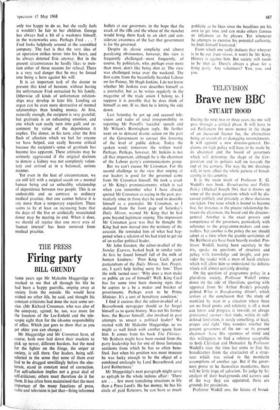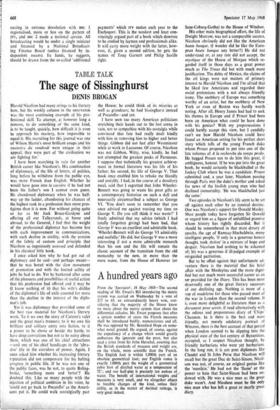Brave new BBC
TELEVISION STUART HOOD
During the next two or three years the Bac will pass through a critical phase. It will have to ask Parliament for more money in the shape of an increased licence fee, the alternatives being an overdraft or damaging retrenchments. It will appoint a new director-general. De- cisions on high policy will have to be made by its chairman and the board of governors which will determine the shape of the Cor- poration and its policies well on towards the end of the century. The way the BBC develops . will, in turn, affect the whole pattern of broad- casting in this country.
It is the main merit of Professor E. G. Wedell's new book, Broadcasting and Public Policy (Michael Joseph 50s), that it throws up. some of the main questions which will be dis- cussed publicly and privately as these decisions are taken. One issue which is bound to become live, for instance, is the precise relationship be- , tween the chairman, the board and the director- general. Another is the exact powers and competence of the governors, particularly with reference to the programme-makers and con- trollers. Yet another is the policy the BBC should adopt at a time when the granite certainties of the Reithean era have been heavily eroded. Pro- fessor Wedell, having been secretary to the 1TA, speaks on questions of structure and policy with knowledge and insight, and pro- vides the reader with a mass of lucid analysis which will allow him to understand the debates which will almost certainly develop.
On the question of programme policy in a pluralistic society, Professor Wedell comes down on the side of liberalism, quoting with approval from Sir Arthur fforde's privately printed What is Broadcasting About?, which arrives at the conclusion that 'the study of mankind by man in a situation where there are no fixed points and relativity is all a man can know and progress is towards an always provisional answer—that study, within its self- defined limitation, is surely something, at least, proper and right.' One wonders whether the present governors of the BBC-or its present chairman-- have this openness of mind and this willingness to find a solution acceptable to both Christian and Humanist. in Professor. Wedell's view the time has come to free the broadcasters from the straitjacket of a struc- ture . which was suited to the mandarin assumptions of another age. But if the gover- nors prove to be themselves mandarins, there will be little hope of salvation. To judge by his analysis of their backgrounds and careers and of the way they are appointed, there are grounds for pessimism.
Professor Wedell sees the future of broad- casting in extreme devolution with BBC 1 regionalised, more or less on the pattern of rrv, and Bac 2 made a national service. All broadcasting would be under a single minister and financed by a National Broadcast- ing Finance Board (unless financed by in- dependent means). Its funds, he suggests, should be drawn from the so-called 'additional payments' which us, makes each year to the Exchequer. This is the weakest and least con- vincingly argued part of a book which deserves to be studied by laymen and professionals alike. It will carry more weight with the latter, how- ever, if, given a second edition, he gets the names of Tony Garnett and Philip Saville right.







































 Previous page
Previous page